EcoStudio in Rice University’s Sustainability Institute and the Rice Office of STEM Engagement (R-STEM) have received a nearly $500,000 grant from the National Academies of Sciences, Engineering and Medicine to expand the Center for Environmental Studies’ (CES) successful environmental justice education summer program for Houston high school students. This funding will enable the university to launch the Houston Environmental Action Learning (HEAL) for High School Teachers and Students program, a two-year initiative that will extend the reach of the current summer program, involving a larger cohort of students and teachers.
“Our top priority is reaching students from schools that historically haven’t received the funding and support they deserve,” said Weston Twardowski, associate director of EcoStudio and one of the principal investigators on the grant. “By engaging these students in meaningful environmental justice issues and exposing them to the resources of a university campus, we’re giving them the tools to explore how environmental challenges impact their communities and to consider ways they can be part of the solution.”
By targeting underserved high schools in the Houston area, HEAL aims to equip 120 students and 24 teachers with the skills needed to address pressing environmental issues through hands-on research, fieldwork and community advocacy across Houston’s high-impact neighborhoods.
“Thanks to this support from the National Academies’ Gulf Research Program and the excellent partnerships with R-STEM and BakerRipley, we can not only expand these efforts but also finally realize an early goal of this program: to engage and support teachers in deepening environmental education in Texas,” said Joseph Campana, the William Shakespeare Professor of English and director of EcoStudio. “And what we learn again and again in our projects at EcoStudio is that the alliance of the arts, humanities and STEM produces spectacular results."
The program evolved from a summer program funded by a Building Research on Inequality and Diversity to Grow Equity (BRIDGE) grant that Twardowski developed and led over the last two years. The summer program is built on engaging students in critical environmental topics and begins with activities like a campus tree tour led by Rice arborist Dawn Roth-Ehlinger that introduces students to the importance of environmental care at a micro level. Over the week, students delve into Houston-specific environmental justice issues on field trips, interacting with experts on food justice, public health and climate impacts.
“Thanks to BRIDGE, we were able to start an extraordinary program under Weston Twardowski’s creative leadership, one that engaged Rice faculty, staff and students in the environmental education of the next generation,” Campana said. “We endeavor to offer these students ways of understanding our moment along with tools for imagining viable, equitable futures.”
This new HEAL initiative with principal investigator Carolyn Nichol, director of R-STEM, will broaden that approach by immersing students in a more extensive program that includes a residential week on campus followed by community-based, action-research projects at BakerRipley campuses in Houston. Each summer, students and high school teachers will explore different environmental themes. In the first year, they’ll focus on land health and land use, addressing issues such as pollution and the impact of hazardous waste. The following year, the group will investigate water quality and flooding concerns in collaboration with Rice’s WaTER Institute.
Nichol said she envisions the students creating artworks, podcasts, blogs, prototypes and other creative approaches to either try to solve environmental concerns or to better inform community members or policymakers.
“The students’ learning will culminate in advocacy projects, giving them a platform to present their findings through digital media, art or written work,” said Randal Hall, CES interim director and the William P. Hobby Professor of History. “By sharing their insights with schools, community organizations and even local government, they’re not only deepening their own understanding of environmental justice but also helping to raise awareness and inspire action on these pressing issues within the broader community.”
The HEAL program also focuses on equipping teachers with tools to bring environmental justice into their classrooms. Over the next two years, 24 local teachers will receive training in project-based learning and environmental justice pedagogy. Teachers will participate alongside students in the residential component, attending specialized sessions led by R-STEM curriculum staff to deepen their understanding of environmental issues and learn facilitation techniques for supporting student projects.
With the goal of empowering future students through classroom-based environmental justice education, teachers will be able to integrate these skills into the Texas Essential Knowledge and Skills-aligned course Environmental Systems, encouraging sustained impact within schools.
Twardowski said it was clear interest in the program is growing. In its second year, the summer program saw a significant increase in applicants, underscoring a strong demand for environmental justice education within Houston’s high schools, a promising sign for the program’s long-term impact.
“Our goal is to build an enduring program that reaches more students each year, offering them the chance to explore environmental justice, science and advocacy in ways that are meaningful to their lives and communities,” Twardowski said. “We envision a future where every student in Houston regardless of background has access to the tools and experiences that empower them to make a difference.”

